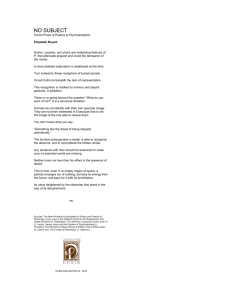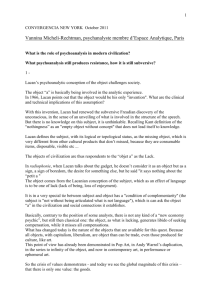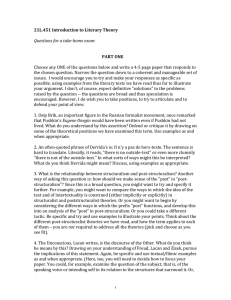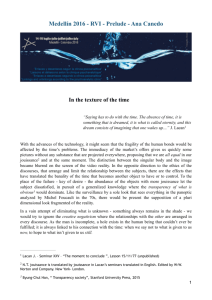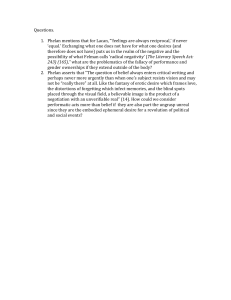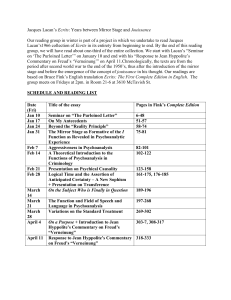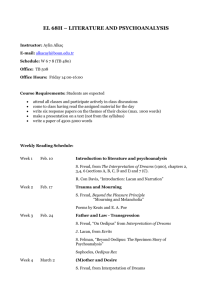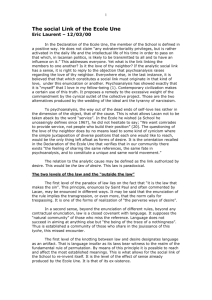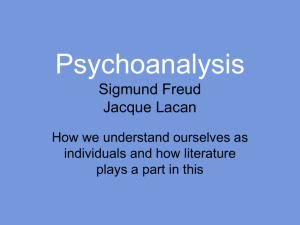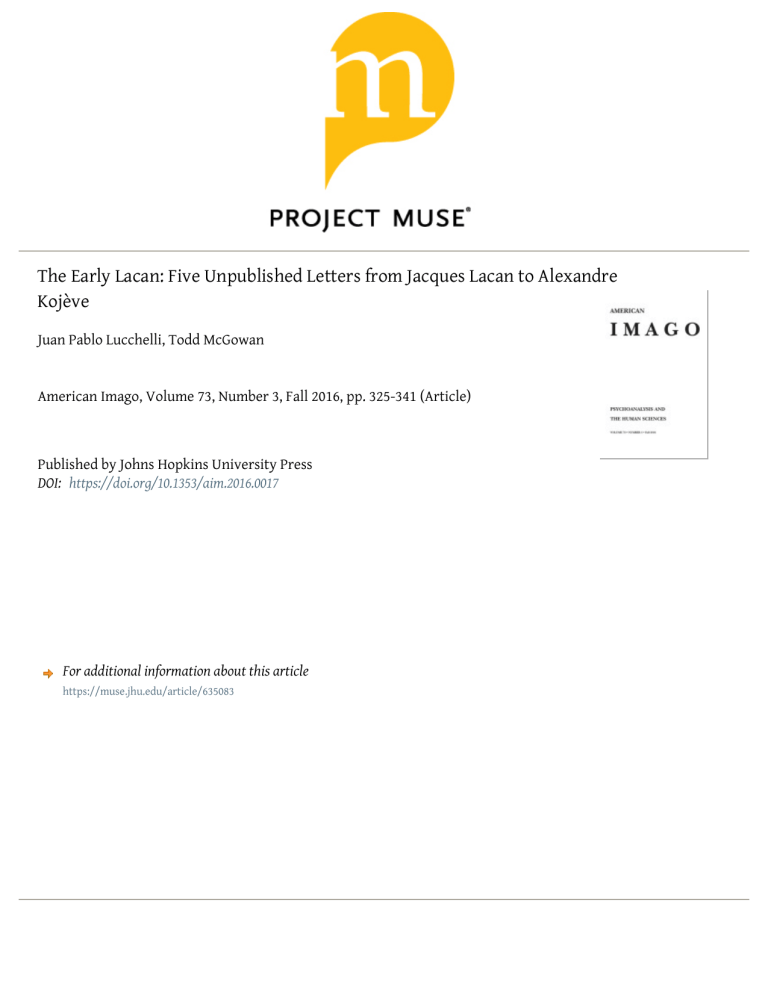
7KH(DUO\/DFDQ)LYH8QSXEOLVKHG/HWWHUVIURP-DFTXHV/DFDQWR$OH[DQGUH .RMqYH -XDQ3DEOR/XFFKHOOL7RGG0F*RZDQ $PHULFDQ,PDJR9ROXPH1XPEHU)DOOSS $UWLFOH 3XEOLVKHGE\-RKQV+RSNLQV8QLYHUVLW\3UHVV '2, KWWSVGRLRUJDLP )RUDGGLWLRQDOLQIRUPDWLRQDERXWWKLVDUWLFOH KWWSVPXVHMKXHGXDUWLFOH Juan Pablo Lucchelli 325 JUAN PABLO LUCCHELLI The Early Lacan: Five Unpublished Letters from Jacques Lacan to Alexandre Kojève Translated by Todd McGowan In the manuscripts section of the Bibliothèque Nationale de France, I found five unpublished letters from Jacques Lacan to Alexandre Kojève, all from the year 1935. In the text that follows, I give an account of this discovery and reflect on what we can discern from the letters concerning not only psychoanalysis and the existence of an “early Lacan” but also and especially what they reveal about the formation of thought and human sciences in France during this epoch. Alexandre Kojève We are aware of the importance that the encounter between Jacques Lacan and Alexandre Kojève had in the formation of the former’s thought, to the extent that Lacan considered Kojève his only master.1 Lacan, like many other intellectuals (including Georges Bataille, Raymond Queneau, Michel Leiris, Henry Corbin, Maurice Merleau-Ponty, and Eric Weil), regularly attended the courses that Kojève gave on Hegel when he replaced Alexandre Koyré at the École Pratique des Hautes Études in the department of Religious Sciences. Kojève had left Russia in 1917 and moved to Berlin in 1920 to study philosophy. His subsequent move to Paris in 1926 (where from 1933 to 1939 he held his seminar on Hegel) made him known in the Parisian intellectual milieu. The author thanks Jacques-Alain Miller for permission to publish this translation of the Lacan-Kojève letters. American Imago, Vol. 73, No. 3, 325–341. © 2016 by The Johns Hopkins University Press 325 326 The Early Lacan While researching the Kojève archive in the manuscript section of the Bibliothèque Nationale de France, I found five unpublished letters from Lacan to Kojève written in 1935. They are five manuscript sheets with the heading of the office of Dr. Lacan, who consulted at the time in the 16th district of Paris. The sheets are in very good condition, even if the writing is sometimes difficult to decipher. All are located in the correspondence of Kojève (Folder L). This discovery has a certain importance because it confirms the existence of an “early Lacan” who does not yet have any debt to structuralism and who is marked fundamentally by Hegelian philosophy (or rather by its introduction in France through Kojève). And even if we understand in a vague way the role that Kojève and his courses on Hegel might have played in Lacan’s education, we know relatively little of the nature of their exchanges. What is more, there are few occurrences of the name “Kojève” in Lacan’s established oeuvre.2 In the 1930s, Lacan set up shop as a psychiatrist in the 16th district of Paris (at 149 Rue de la Pompe), following a training analysis with Rudolph Loewenstein and after doing what was necessary to become a member of the Société Psychanalytique de Paris. At the same time and after having successfully defended his thesis in 1932 on the famous “Aimée Case,” he began to form his theory, especially his ideas on philosophy. He also hung out with the group of surrealists who published the journal Minotaure. Alexandre Kojève, for his part, held a seminar entitled “Hegel’s Religious Phenomenology.” It was a reading of and an introduction to the Phenomenology of Spirit, which he gave at the École Pratique des Hautes Études on Monday evenings at 5:30.3 For three years (from 1934 to 1937), Lacan is recorded as an “assiduous attendee” in the yearbooks of the École Pratique des Hautes Études. According to the yearbooks, the first year of the course that he attends begins with the academic year 1934. But we cannot exclude the possibility, as others have suggested, that Lacan attended earlier—that is, beginning in 1933. The first letter addressed to Kojève is dated March 21; the second year of the seminar (1934–35) had been well underway and is almost over. This first missive is a personal invitation to Juan Pablo Lucchelli 327 dine at Lacan’s. It was certainly the first time, confirming that the two young men saw each other often but were not friends. Still, this dinner was not just a simple everyday get together. It was also a working meeting, since Lacan asks Kojève to shed light on a specific subject: “I am very appreciative that you are willing to give me your time and your insights on a subject that affects me so deeply.” We know nothing about the subject in question, but one can presume that it touches on the Phenomenology of Spirit and the place of madness in it. We will see why. Regular Meetings or the Seeds of the Future Seminar? The other element that stands out from this brief written exchange is probably the most interesting aspect of this discovery. From the second of the letters, dated March 31, we learn that Lacan organized meetings at his home with different participants from 1935 on and probably well before. He writes, “I take the liberty of reminding you that our regular meeting will take place at my house this Monday, April 1, at 9 in the evening. You will be welcome among us whenever you are able to come.” It goes without saying that this refers to “regular meetings” that Kojève did not attend regularly. Otherwise, Lacan would not need to remind him. The regularity of the meetings at Lacan’s house becomes evident from another letter, the one from November 20, where, in addition to information about the regularity of the gatherings, one also discovers possible internal tensions between the participants. Lacan writes, “But I hope that soon our meetings of last year will resume, if those who came together for them are again interested to battle it out here.” The gatherings at Lacan’s house thus began in the previous academic year; they often took place on Mondays and had very likely occurred bimonthly, as the letter of May 17 suggests. In the May 17 letter we also discover that Kojève’s presence becomes necessary. This is the second time that Kojève is asked to participate in the meetings, the first request having been made in the March 31 letter. On May 17, Lacan writes, “Since you are not free this Thursday, I realized that I could delay for 328 The Early Lacan two weeks the day for the resumption of our periodic meetings. The next one will take place this Monday, May 20, and I would be very happy if you could honor it with your presence.” Lacan changes the date because of the availability of the philosopher, whose knowledge he wants there, as well as documents only he possesses. The rest of the letter—“It would be a great pleasure for me if you thought to bring me the text, ‘Glauben und Wissen,’ that you have cited”—indicates this clearly. What should interest us in these exchanges is the eventual relationship between the group started by Lacan and Kojève’s seminar, and more particularly, between Lacan and Kojève. For example, even if Kojève was the one with philosophic knowledge, the exchanges did not always move only in one direction. Lacan participated in Kojève’s sessions on Hegel and contributed actively to them. In addition, we note that the tone changes and that a proximity between the two men emerges, as indicated in the letter of November 20, which Lacan addresses to his “friend”: “Thanks for letting me know about your resumption of your course, which I was just starting to worry about. I will certainly be present this Friday and the others . . . a little late, so often impossible to avoid, which forces me to slip in at the edge of the table right in the middle of your talk, which I apologize for. I will participate, to the extent that I can contribute something original, to the working discussions that you wish to be—and that effectively seem to me to be—fecund.” The same letter of November 20 gives an account of the writing of Lacan’s text “The Family Complexes”: “I am entirely absorbed for the moment by an article that I was talking to you about before vacation—on the family, considered from a psychological point of view.” Can we thus confirm that the text published in the Encyclopédie Française is impregnated with a certain Kojèvian Hegelianism, a Hegelianism that will most likely come to an end with the encounter with Claude LéviStrauss after the war? The Russian, who deals with “absolute knowing,” was surrounded by an aura of knowledge in the eyes of Lacan, an aura that probably owed much to Kojève’s charisma and to the originality of his method of reading, as attested to by the statement of Raymond Queneau some years later. Referring to the seminars that Lacan began in the early Juan Pablo Lucchelli 329 1950s, Queneau says, “He [Lacan] does commentaries, according to Kojève’s method, on Freud’s texts.”4 But before discussing Lacanian Hegelianism, let us say a word about the group that got together at Lacan’s house. Who were the participants at the regular meetings and how long had they been getting together? What kind of relationship did these meetings have to Kojève’s seminar and, more precisely, were the participants in Kojève’s seminar also at the meetings at Lacan’s house? It would have been very difficult to reconstruct the facts and to have any idea about the persons involved in the meetings at Lacan’s house if we did not have at our disposal the draft of a letter from Georges Bataille. At the Bibliothèque Nationale de France I was able to consult the correspondence of Bataille, in which one finds the draft of a letter, addressed to Michel Leiris, dating probably from the end of 1934, according to Marina Galletti, who gives an account of it in Bataille’s published correspondence.5 In the draft letter, Bataille writes, “As for the meeting at Lacan’s house, I would be grateful to you if you let Queneau know that I have the intention to leave immediately if he comes.”6 This information would indicate first that meetings at Lacan’s house very likely began at least in 1934 (what one might well imagine since the first of the letters from Lacan to Kojève is dated March 1935). Second, it informs us of at least four of the participants at the meetings at Lacan’s house: the host, Raymond Queneau, Georges Bataille, Michel Leiris, and, also more than likely, René Entiemble. Third, we learn of tensions between certain participants, as also suggested by Lacan’s phrase cited above in the letter to Kojève (“I hope that soon our meetings of last year will resume, if those who came together for them are again interested to battle it out here”). Finally, at least four people also attended Kojève’s course on Hegel; even Kojève was invited to come to Lacan’s group to give his insights. Was it, then, a form of “extra seminar” parallel to Kojève’s that Lacan proposed? Nothing permits us to confirm such a hypothesis for the pure and simple reason that the people knew each other already before the beginning of Kojève’s seminar. Looking more closely, one notes that these four people implicated in Bataille’s letter from 1934 were linked 330 The Early Lacan for many years through the surrealist group that published in the journal Minotaure. If one adds to that as valid information the fact that Etiemble participated in the meetings at Lacan’s house while he was not part of Kojève’s group, one can then affirm that the group that got together at Lacan’s house was quite independent of the philosopher’s course. The letter of March 31, in which Lacan invites Kojève to come to the next session, also shows that the study group or seminar at Lacan’s house existed in an independent manner from Kojève’s course. The letter states, “I take the liberty of reminding you that our regular meeting will take place at my house this Monday, April 1, at 9 in the evening. You will be welcome among us whenever you are able to come.” In other words, Kojève can participate, but the meeting will take place in any event. At the same time, the phrase “I take the liberty of reminding you” indicates that Kojève is aware of the existence of the meetings at Lacan’s house—probably well before the date of the letter. But the question concerning the date of the beginning of these encounters at Lacan’s house, especially in relation to Kojève’s course, remains unanswered. Was Queneau the intermediary between the two groups? In any case, nothing attests to it in the newspapers of the time. Let us turn now to the question of whether these meetings were the first incarnation of what became, fifteen years later, Lacan’s seminar. We cannot exclude this hypothesis.7 Indeed, the fact that the encounters happened at Lacan’s house and that he was interested in advancing the questions that the group took up, as the repeated requests to Kojève indicate, leads us to put forward precisely this claim. The fact that Lacan had been the host of the group could seem, in itself, merely anecdotal, especially if one reads the letter from Bataille to Leiris against a different light: there the stakes of the publication of a journal take priority, at the same time as they create tensions between the participants, demonstrating in this way that the group was already very active. But Lacan is likely the only one to have invited Kojève to participate in the meetings and, significantly, the only one to create a seminar at his house fifteen years later.8 Clearly, it is not only retroactively that the hypothesis of the meeting as an early form of the seminar acquires meaning. Juan Pablo Lucchelli 331 But a final question, to which we will return, arises regarding this incipient form of the seminar. Does Lacan’s testimony that he did not work during the Second World War imply that the group no longer got together during the Occupation? A Joint Text on Hegel and Freud In her biography of Lacan, Élisabeth Roudinesco informs us that Kojève prepared a text on Hegel and Freud in collaboration with Lacan. The source of this information is Dominique Auffret, according to whom the manuscript in question—written in Russian, dated July 1936—was divided into three parts: “Genesis of Self-consciousness”; “The Origin of Madness”; and “The Essence of the Family.”9 Thanks to diverse documents and publications, we can unravel the chronology of each chapter in turn and see what were the probable respective destinies of the different parts. The “Genesis of Self-Consciousness” was probably given in the first year of Kojève’s seminar (1933), according to the notes taken by Queneau and published for the first time in January 1939 in the journal Mesures (which does not necessarily imply that the text Kojève was preparing for publication repeated all the notes of the course for the year 1933). As the letter of December 27 indicates, “The Origin of Madness” comes from a commentary that Lacan was preparing for Kojève. In this letter, Lacan proposes to Kojève that “we might set an appointment for preparing the passage from the Phenomenology on madness . . . I will be as honored to collaborate with your commentary as I am desirous to make use of it to the greatest extent that I can.” The content of this letter prompts one to think that it was Kojève who questioned Lacan about madness in the Phenomenology of Spirit and that the latter was going to advise him on the pertinence of the Hegelian position. There are two elements to emphasize here. On the one hand, it is, of course, Lacan who has knowledge of psychiatry: he had already proved himself practically as a doctor at the Hôpital Sainte-Anne and intellectually with his thesis of 1932. On the other hand, it is significant that Lacan had been able to speak at Kojève’s 332 The Early Lacan seminar, especially on the topic of Freud. In the manuscript’s third part, concerning “The Essence of the Family,” one can recognize the subject of Lacan’s work, as we have already seen from the letter from November 20. This part, without doubt, helps to prepare the future “Family Complexes” that certainly owes much to Kojève’s 1935 course, which addressed in part the place of the family in the Phenomenology of Spirit. The Summaries in the Yearbooks of the École Pratique des Hautes Études As mentioned, the École Pratique des Hautes Études published yearbooks in which it informed the public on the themes of discussion, the talks given, and the listeners who attended the courses given by the designated teachers. Introduction to the Reading of Hegel (Introduction à la lecture de Hegel), published in 1947 and edited by Queneau, derives from the collection of notes that Queneau took from Kojève’s course between 1933 and 1939. With the notes, Queneau inserts summaries established by Kojève and extracted from the yearbooks of the École Pratique des Hautes Études. The yearbooks published the proposed courses for the academic year followed by practical information for attending the courses, as well as the summaries of courses from the past year. This was also the case for Kojève’s talks (for which the name “Kojevnikov” was not yet Frenchified). Thus, as I have already indicated, during three years (1934–35, 1935–36, and 1936–37), Lacan figures as an “assiduous attendee” in the yearbook of the École Pratique des Hautes Études. In the first year that Lacan attended (1934–35), the courses naturally began with the beginning of the school year. Among the information given in the yearbook (which also anticipates what will occur the next year), we learn who the “assiduous attendees” were, as well as the “Degree Students” and the “Permanent Students.” If Lacan figures as an “Assiduous Attendee” in the yearbook from 1935–36, this means that he attended at least from the beginning of the 1934–35 academic year. But in Juan Pablo Lucchelli 333 the yearbook for 1934–35 (which corresponds to the 1933–34 school year), we fail to find the name “Lacan” among the participants; we do, however, find “Queneau” as an “assiduous attendee.” We must wait for the yearbook for 1935–36 to see “Lacan” next to “Queneau,” “Weil,” and “Bataille.” The yearbook for 1936–37 contains the summaries of 1935 when Lacan was still an “assiduous attendee;” he remained in the same position in 1937–38. At the end of the information presented in the yearbook for 1937–38, we learn that during Kojève’s 1935 course Lacan intervened on the subject of “madness” in Hegel. (I have mentioned above the letter that concerns the possibility of his elaborating a commentary.) In the conclusion of the summary for that course (cited in the 1936–37 yearbook) we read: “the interpretation of the section devoted to the analysis of pleasure (Lust), was made by Mr. Adler. Mr. Lacan interpreted the passages relative to Madness (Wahnsinn ds Eigendünkels) and gave a suggestive talk, inspired by Freud, dedicated to a confrontation between Hegelian anthropology and modern anthropology.”10 This paragraph, which ends the summary of 1935, was suppressed in the Introduction, where the name “Lacan” never appears.11 Why give such attention to this detail? Because it indicates that Lacan was in dialogue with Kojève and that he brought a specific type of knowledge to him. In effect, it is not often that the yearbook elaborates, in what would only be a few lines, the content of the interventions of participants—but that was the case with Lacan’s intervention, indicating that it possessed value for Kojève as the head of the seminar. Even more importantly, the yearbook passage states that Lacan gave a suggestive talk. Further, as far as we know, none of the other participants (Bataille, Leiris, or especially Queneau) had ever given a talk during the course on Hegel. Thus, it is possible to conclude that even if the group that got together at Lacan’s house existed independently of Kojève’s seminar Lacan was in dialogue with Kojève—an asymmetrical but decisive dialogue for the psychoanalyst. 334 The Early Lacan The Mirror Stage: A Kojèvian Reading of Wallon A further point seems to me essential for understanding how important the encounter with Kojève was in the formation of what one could call the “first Lacan.” In 1936, Lacan presents his famous mirror stage during an international conference at Marienbad. In 1938, this talk is partially repackaged in one of the chapters dedicated to “Mental Life” in volume 8 of the Encyoclopédie Française. The editorship of the publication was given to Henri Wallon, a professor at the Collège de France. (Lucien Febvre headed the publication.) Even if some critics might point out that Lacan did not cite Wallon a great deal in his work, and although the mirror stage is based on his observations, Wallon himself based his own work on the observations of other writers (including Darwin).12 What counted for Lacan here? Essentially two aspects: first, the fact that the little child uses the image of the fellow creature in order to discover the unity of his or her body, which is, because of its premature birth, psychologically “fragmented”13; and second, the fact that because this unity is only present in the other, this image that gives the subject its unity cannot escape a subjective discordance, a discordance that translates into a first moment of anxiety for the living being. Is the influence of Kojève’s course directly present in this redoubled conception of being at this stage? I think that we must answer that it is, and that it entails a Kojèvian reading of the contributions of Wallon. Introduction to the Reading of Hegel specifically discusses the passing from simple sensation to more structured perception, as determined by consciousness. One reads: “At this stage [the passage from sensation to perception], the being is fragmented.”14 Lacan’s friend Queneau took these notes from the course for 1933–34. It would perhaps be no exaggeration to suppose that Lacan took his own notion of the “fragmented body” directly from Kojève’s course, either because he already attended it in 1933 (even if he is not yet listed as an “assiduous attendee”) or because Queneau gave Lacan his notes.15 But that is not all for our interpretation of the first Lacan: the Kojèvian reconstruction of the Phenomenology implies precisely the concept of stages. In the first phase, Kojève Juan Pablo Lucchelli 335 describes children as if they are ready naively to perceive the world: “It is the cognitive attitude of the ‘naïve’ man; in the exclusive state like perhaps that of the child at a young age . . . a necessary attitude as a ‘moment.’”16 When we consider that Lacan gave an important place to weaning, to the breaking off of lactation as a qualitative interruption of a quantitative and biological continuity, and that for Lacan birth is a birth in and by language, we have in this paragraph cited from the Introduction the basis if not for the mirror stage then at least for a moment that certainly derives nothing from biology but instead concerns a subjective mutation. The arbitrariness of culture imposes weaning, which occasions a qualitative leap different in register from what, according to the physical sciences, characterizes the process.17 The Place of Madness in Reason We cannot neglect another highly visible element: Lacan’s intervention in Kojève’s course on madness. Let us take again the suppressed passage from Introduction to the Reading of Hegel: “Mr. Lacan interpreted the passages relative to Madness (Wahnsinn des Eigendünkels) and gave a suggestive talk, inspired by Freud, dedicated to a confrontation between Hegelian anthropology and modern anthropology.” Two propositions follow from this. First, as I have already indicated, Lacan brought his clinical knowledge to the philosopher. To recognize this, we have only to read those notes to the Introduction precisely corresponding to 1935: “If, by birth, the individual doesn’t adapt to the society, he or she is a madman or madwoman (or a criminal). His idea is crazy (or criminal). If the individual realizes the idea, transforming the society that he or she ‘critiques,’ he or she transforms himself or herself and his or her idea ceases to be crazy.”18 The theme of madness and of crime is very Lacanian, especially if one thinks of the “Aimée” case in 1932, as well as that of the “Papin Sisters,” about whom Lacan had written in 1933, cases that suggest here it was Kojève who based himself on Lacan.19 Second, and reciprocally, the passage just cited from the Introduction also evokes what Lacan argued concerning mad- 336 The Early Lacan ness and its relationship with reality. He writes in “Presentation on Psychical Causality”: “Don’t think that I am being witty, certainly not with the quality of wit that shows in the saying that Napoleon was someone who thought he was Napoleon. Because Napoleon did not think he was Napoleon at all, since he knew full well by what means Bonaparte had produced Napoleon and how Napoleon, like the Malebranche’s God, sustained his existence at every moment.”20 Here Hegel has his place, as Lacan attempts to show how madness concerns being insofar as it has been redoubled by the dialectic: “Do not think that I am getting off on a tangent here in a talk designed to go right to the heart of the dialectic of being—because the essential misrecognition involved in madness is situated at just such a point . . . This misrecognition can be seen in the revolt through which the madman seeks to impose the law of his heart onto what seems to him to be the havoc of the world.”21 We should not fail to note the following passage in Kojève’s Introduction that established these notions ten years before Lacan’s “Presentation on Psychical Causality”: “How does the law of the heart differentiate itself from Man-of-pleasure . . . He is not able to realize his pleasure . . . because he opposes something to the given World (to the Society): a utopia . . . He is not a revolutionary.”22 For Lacan, madness roots itself in the question of being insofar as it is inseparable from being’s dialectical realization, as he learned through Kojève. References both to Hegel’s philosophy and to Kojève’s course are explicit in this important early writing on psychosis by Lacan.23 And like the allusion to the stage of fragmented being, so the explicit references to Napoleon and to madness in “Presentation on Psychical Causality” place us again on the trail of an early Lacan from the 1930s who made his first steps outside of psychiatry thanks to Kojève, whom he recognized moreover as his “master.” Conclusion The five unpublished letters that follow this essay testify to the existence of an “early Lacan” who does not yet owe anything to the Lévi-Straussian encounter. This early Lacan is Juan Pablo Lucchelli 337 especially marked by the contact with Alexandre Kojève and by this singular theorist’s course on Hegel. The effect could have been passive: Lacan was on the lookout for theoretical tools in order to be able to comprehend both madness and psychoanalysis. He grasped that Freudian theory was not yet sufficient to understand the Freudian discovery, and one sees how Lacan might have been contemplating a work that one could call “Freud with Hegel.” This early Lacan was already searching for experiences different from that of psychoanalysis: his attendance at the surrealist group in the 1930s—a group that included members, like him, who attended Kojève’s courses—fell within the shadow cast by an ambition that surpassed that of standard psychoanalysis. The group that met at Lacan’s house, probably at Lacan’s initiative, suggests to us the existence of a quest not limited to seeking university knowledge but also, to the contrary, the vital performativity that characterizes all emerging knowledge. One can easily suppose that only the war brought an end to this first period for Lacan, marked as it was by the reading of Kojève, undertaken by a theorist searching to understand the emergence of Napoleon. Five Letters from Lacan to Kojève Letter 1 Doctor Jacques Lacan Former Head of the Clinic at the School 149 Rue de la Pompe Tel: Kléber 97–80 By appointment Dear Sir, My wife and I are expecting you for dinner, as we have arranged, tomorrow, Friday, at 8:15. I am very grateful that you are willing to give me your time and your insights on a subject that affects me so deeply. Devotedly yours, Jacques Lacan March 21, 1935 338 The Early Lacan Letter 2 Doctor Jacques Lacan Former Head of the Clinic at the School 149 Rue de la Pompe Tel: Kléber 97–80 By appointment Dear Sir, I take the liberty of reminding you that our regular meeting will take place at my house this Monday, April 1, at 9 in the evening. You will be welcome among us whenever you are able to come. Warmly yours, Jacques Lacan March 31, 1935 Letter 3 Doctor Jacques Lacan Former Head of the Clinic at the School 149 Rue de la Pompe Tel: Kléber 97–80 By appointment Dear Sir, Since you are not free this Thursday, I realized that I could delay for two weeks the day for the resumption of our periodic meetings. The next one will take place this Monday, May 20, and I would be very happy if you could honor it with your presence. It would be a great pleasure for me if you thought to bring me the text, “Glauben und Wissen,” that you have cited.24 Devotedly yours, Jacques Lacan May 17, 1935 Juan Pablo Lucchelli 339 Letter 4 November 20, 1935 Doctor Jacques Lacan Former Head of the Clinic at the School 149 Rue de la Pompe Tel: Kléber 97–80 By appointment Dear Friend, Thanks for letting me know about your resumption of your course, which I was just starting to worry about. I will certainly be present this Friday and the others . . . a little late, so often impossible to avoid, which forces me to slip in at the edge of the table right in the middle of your talk, which I apologize for. I will participate, to the extent that I can contribute something original, to the working discussions that you wish to be—and that effectively seem to me to be—fecund. I alerted Queneau according to your request. I am entirely absorbed for the moment by an article that I was talking to you about before vacation—on the family, considered from a psychological point of view. But I hope that soon our meetings of last year will resume, if those who came together for them are again interested to battle it out here. Yours kindly—my regards to your wife, Jacques Lacan Letter 5 Doctor Jacques Lacan Former Head of the Clinic at the School 149 Rue de la Pompe Tel: Kléber 97–80 By appointment 340 The Early Lacan December 27, 1935 Dear Sir, Excuse me for not being able to be there at your last course, as I had told you I would. Would you be so kind as to phone me tomorrow, Saturday, or Sunday at lunch hour, for example, so that we might set an appointment for preparing the passage from the Phenomenology on madness? I will be as honored to collaborate your commentary as I am desirous to make use of it to the greatest extent that I can.25 Yours with fervent esteem, Jacques Lacan Notes 1. 2. 3. 4. 5. 6. 7. 8. 9. 10. 11. 12. 13. 14. See Jacques Lacan, Autres Écrits (2001), pp. 331, 453. The inscription from Lacan to Kojève in the first issue of La Psychanalyse (1956, July 13) is even more revealing. He writes, “for Kojève, who was my master (truly the only).” This appears in Kojève’s private library, which his widow gave to the Bibliothèque Nationale de France. Surprisingly, one does not find “Kojève” in the index of proper names in the Écrits, even though he is cited in a footnote. Kojève also gave lectures on Fridays at 5:30 in the evening. See Raymond Queneau, Journal, 1914–1965 (1996), p. 852. See Georges Bataille, L’apprenti sorcier: textes, correspondances et documents (1932– 1939), edited by Marina Galletti (1999), p. 124. See Georges Bataille [1934], Correspondance, NAF 15853, sheet number 92. This is the draft of a letter addressed to Michel Leiris where, on the bottom of the page, one reads the cited sentence. The finished letter of this draft was published in Georges Bataille, Choix de lettres (1917–1962), edited by Michel Surya (1997). There, Surya makes it clear that René Etiemble must have participated in the meetings at Lacan’s house. He cites this statement from Etiemble in a footnote: “I had sometimes need of all my courage—I who wrote L’Enfant du choeur—to resist the scenes and decorations that Bataille provided” (p. 104). This last one named has the greatest importance. I owe this conjecture to Jean–Claude Milner. In effect, Lacan begins his seminar on the Wolf Man, the clinical case written by Freud, in 1951 at his house on Rue de Lille. See Elisabeth Roudinesco (1997), p. 105. See Annuaire de l’École Pratiques des Hautes Études (1936–37), p. 88. The same holds for the others who intervened. See Henri Wallon’s Les origines du caractère chez l’enfant (1949). See Jacques Lacan, “The Mirror Stage as Formative of the I Function as Revealed in Psychoanalytic Experience,” (1949/2006), p. 76. See Alexandre Kojève, Introduction à la lecture de Hegel (1947), p. 45. Emphasis added. Juan Pablo Lucchelli 341 15. In his journal, Queneau writes, “In fact, Bataille has my notes from Kojève’s course” (1996, p. 386). One might imagine that Queneau was not especially open with his notes, if one remembers that he kept his journals since the age of eleven. But this passage in his journal proves the contrary. In any case, he would have been able to communicate to others the content at the meeting at Lacan’s house. 16. See Kojève (1947), p. 43. 17. In truth, the first Lacanian was Hegel. We can read in the beginning of the The Phenomenology of Spirit: “the first breath drawn by a child after its long, quiet nourishment breaks the gradualness of merely quantitative growth—there is a qualitative leap, and the child is born” (1977, p. 6). 18. See Kojève (1947), p. 88. 19. See Jacques Lacan, “Motifs du Crime Paranoïaque,” Minotaure, 3/4 (1933–1934). Hegel discusses madness but does not mention the notion of crime during this discussion. See the section entitled “The Law of the Heart and the Frenzy of Self-Conceit” in The Phenomenology of Spirit (1977), pp. 221–228. 20. See Jacques Lacan, “Presentation on Psychical Causality” (1946/2006), p. 140. 21. See Lacan, (1946/2006), p. 140. 22. See Kojève (1947), pp. 87–88. 23. See Lacan, (1946/2006), p. 158. 24. Author’s note: I asked Jean-Claude Milner to read the photograph taken of this letter because the word Wissen is not clear. He suggested to me the title of Hegel’s early work. 25. Author’s note: Jean-Claude Milner tells me that the summaries of these talks by Kojève at the École Pratique des Hautes Études, are those archived on the site Persée (http://www.persee.fr/web/ouvrages/home/prescript/fond/ephe). The summary of 1935 mentions Jacques Lacan’s intervention as follows: “Mr. Lacan interpreted the passages relating to madness (Wahnsinn des Eigendiinkels), and gave a suggestive talk entitled “Toward the Confrontation of Hegelian Anthropology with Modern Anthropology, Inspired by Freud.” References Annuaire de l’École Pratiques des Hautes Études. (1933–1938). Bataille, G. [1934]. Draft of letter to Michel Leiris. Correspondance, NAF 15853, sheet number 92. Bibliothèque Nationale de France, Paris. Bataille, G. (1997). Choix de lettres (1917–1962). (M. Surya, Ed.). Paris: Gallimard, 1997. Bataille, G. (1999). L’apprenti sorcier: Textes, correspondances et documents (1932– 1939). (M. Galletti, Ed.). Paris: Editions de la Différence. Hegel, G.W.F. (1977). The Phenomenology of Spirit. (A. V. Miller, Trans.). (Oxford: Oxford University Press. Kojève, A. Introduction à la lecture de Hegel. (R. Queneau, Ed.). Paris: Gallimard, 1947. Lacan, J. (1933–1934). Motifs du crime paranoïaque. Minotaure, 3/4. Lacan, J. (2001). Autres écrits. Paris: Seuil. Lacan, J. (1946/2006). Presentation on psychical causality. In Écrits: The first complete edition in English. (B. Fink, Trans.). New York: W.W. Norton. Lacan, J. (1949/2006). The mirror stage as formative of the I function as revealed in psychoanalytic experience. In Écrits: The first complete edition in English. (B. Fink, Trans.). New York: W.W. Norton. Queneau, R. (1996). Journal 1914–1965. Paris: Gallimard. Roudinesco, E. (1997). Jacques Lacan. (B. Bray, Trans.). New York: Columbia University Press. Wallon, H. (1949). Les origines du caractère chez l’enfant. Paris: PUF.
